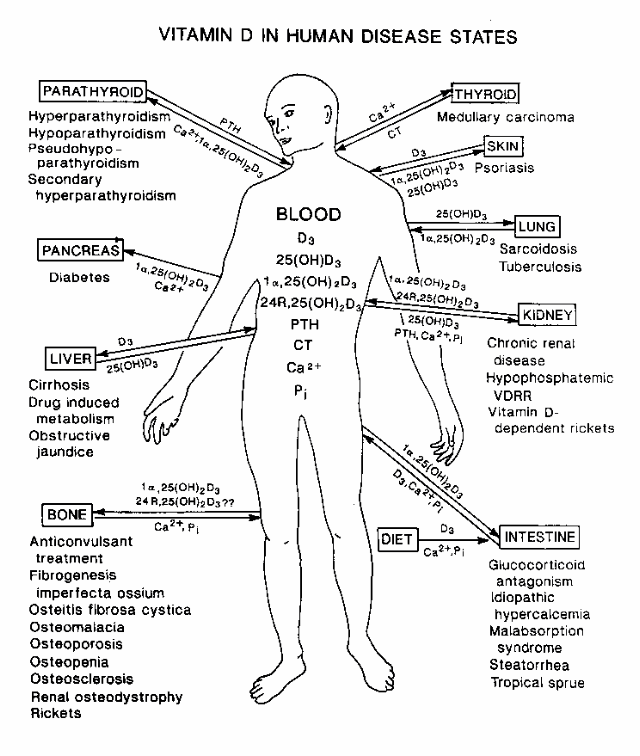|
Vitamin D and Diseases: Cause or Effect?
There seems to be a pretty wide-spread consensus that there is a direct correlation between Vitamin D and diseases. Specifically, researchers have found low levels of vitamin D across a wide-range of diseases and as you will learn (if you read some of the other articles on our web site) increasing your vitamin D levels helps reduce your risk of these diseases, and in cases where you have a health problem … can be helpful as part of a recovery strategy.
Here’s a list of diseases discussed in the book, Vitamin D3 and Solar Power that are caused or made worse by vitamin D deficiencies. Source: Dr. Mercola For information on which diseases Vitamin D will help the most, watch this brief video:
Diabetes mellitus, multiple sclerosis, and rheumatoid arthritis, are each examples of autoimmune disease. Autoimmune diseases occur when the body launches an immune response to its own tissue, rather than a foreign pathogen. Treatment with vitamin D has beneficial effects in animal models of all of the above mentioned diseases. The results of several studies also suggest that adequate vitamin D intake may decrease the risk of autoimmune diseases. Evidence from animal models and human studies suggests that maintaining sufficient vitamin D levels may help decrease the risk of several autoimmune diseases, but more studies are needed to draw any solid conclusions. Studies have found that the prevalence of diabetes, multiple sclerosis, and rheumatoid arthritis increases as latitude increases, suggesting that lower exposure to sun light and associated decreases in vitamin D synthesis may play a role in the development of these diseases.
The figure below presents a schematic diagram of the metabolic processing of vitamin D by the endocrine system. 
Listed under each of the various metabolic or regulatory sites are disease states that are known to be clinically focused at that particular locus. Conceptually, human clinical disorders related to vitamin D can be considered as those arising because of: (a) altered availability of vitamin D; (b) altered conversion of vitamin D3 to 25(OH)D3; (c) altered conversion of 25(OH)D3 to 1_,25(OH)2D3 and/or 24R,25(OH)2D3; (d) variations in end organ responsiveness to 1_,25(OH)2D3 or possibly 24R,25(OH)2D3; and (e) other conditions of uncertain relation to vitamin D. As a consequence of the significant scientific advances in the understanding of how vitamin D generates biological responses [principally via 1a,25(OH)2D3], a number of new drug forms of 1a,25(OH)2D3 have been generated by pharmaceutical companies. source: University of California Riverside Note: You can decide whether you want to rely on pharmaceutical research to treat your vitamin D deficiency and combat specific medical problems, or the more natural preventative route (i.e., vitamin D from sunshine, from food, and from supplements).
While almost all medical practioners who are advising their patients or doing research in Vitamin D feel that Vitamin D deficieny is a contributor to the diseases listed above – there is a small dissenting opinion. The Marshall Protocol is an ongoing research study (primarily focused on autoimmunity research), which believes that where low levels of vitamin D have been associated with disease, this is not because low levels are causing disease, but because the disease processes themselves have taken control of the vitamin D regulatory process. This would mean that the low values of vitamin D are the result, not the cause, of the disease. Researchers on the Marshall Protocol believe that pathogens invade the nuclei of many of the body’s cells over time, causing inflammation and chronic disease. They also release substances that stop the VDR from working correctly; so it is unable to produce anti-micrbial peptides and proteins to kill the pathogens, and it is unable to regulate itself – it has no ‘turn off’ switch, and so levels of 1,25-D (the active form of vitamin D) keep growing.
Vitamin D is important for good health and long-life. Here are some of the articles we've added to our website to give you a full picture of this important subject. Like other parts of this website, these articles summarize the important facts and include useful advice. If Vitamin D Were a Drug It Would Win the Nobel Prize Vitamin D Deficiency: Causes and Risk Factors Learn to recognize the symptoms of vitamin D deficiency, especially in women and children Testing Your Vitamin D Levels: (know what to ask your doctor, or order a home testing kit) Getting Vitamin D from Sunshine What you need to know when choosing a Vitamin D supplement Vitamin D Deficiency is linked to 2/3 rds of the medical problems in the US along with poor diet Vitamin D helps prevent 3 out 4 cancers Vitamin D is Important for Good Heart Health Vitamin D and Calcium: You Need Them Both Vitamin D deficiency can cause mobility problems
The information contained in this section of our web site is for educational purposes and is not intended as medical advice. While the publishers of this website believe that people have the right to understand their own bodies and to take care of their bodies as they see fit, we also respect the knowledge and experience of trained nutritionists, scientists, researchers, medical practioners, and others who can help you achieve the optimum health you are entitled to, and suggest you seek out and work with health specialists you can trust.
Click on the highlighted word to return the top of this section on Vitamin D and diseases or to return to the first introductory article about Vitamin D.
|


